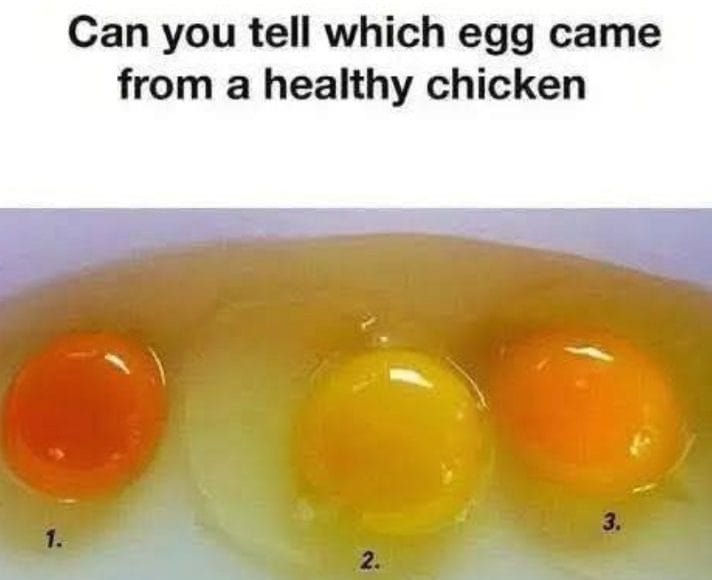How to Tell If an Egg Came from a Healthy Chicken: 6 Signs of Superior Quality
When it comes to choosing eggs, freshness isn’t the only factor that matters. The health and care of the chicken that laid the egg can have a direct impact on its flavor, nutrition, and overall quality. Chickens that are well-fed, stress-free, and allowed to roam naturally tend to produce eggs that are richer in taste, denser in nutrients, and more visually appealing.
Below are six telltale signs that your eggs come from healthy, well-treated hens — plus one bonus tip for making the most ethical and nourishing choice for your table.
1. Rich, Golden-Orange Yolk
- What to Look For: A deep golden or vibrant orange yolk is a hallmark of a nutrient-dense egg.
- Why It Matters: The color comes from carotenoids, which hens absorb from grasses, flowers, and insects during natural foraging. These yolks tend to be higher in vitamin D, omega-3 fatty acids, and antioxidants, supporting better heart and brain health.
2. Thick, Gel-Like Egg White
- What to Look For: The egg white (albumen) should be firm and slightly gelatinous, not watery.
- Why It Matters: A dense, high-protein albumen signals freshness and proper hen nutrition. Runny whites often mean the egg is older or the hen’s diet is lacking in essential minerals and amino acids.
3. Strong, Well-Formed Shell
- What to Look For: A sturdy, slightly textured shell that feels durable when gently pressed.
- Why It Matters: Healthy hens with enough calcium and trace minerals produce shells that protect the egg’s freshness. Farmers often supplement diets naturally with crushed oyster shells or limestone to maintain shell strength.
4. Pleasant Aroma and Creamy Taste
- What to Look For: Fresh eggs should smell clean and have a rich, creamy flavor when cooked.
- Why It Matters: Poor diets, stress, or cramped conditions can lead to bland or off-flavored eggs. In contrast, pasture-raised hens produce eggs with a fuller, more satisfying taste — ideal for gourmet cooking and home baking.
5. Minimal Imperfections or Blood Spots
- What to Look For: Occasional tiny blood spots are harmless, but frequent imperfections can indicate stress or poor conditions.
- Why It Matters: Low-stress environments and balanced nutrition lead to more consistent egg quality and fewer shell or yolk irregularities.
6. Verified Ethical Farming Practices
- What to Look For: Labels like pasture-raised, organic, free-range, or non-GMO. Better yet, ask your farmer directly about their methods.
- Why It Matters: Ethically raised hens with space to roam and varied diets produce eggs that are both better for you and better for the planet. Supporting humane farming also encourages sustainable agriculture.
Bonus Tip: Buy Local When Possible
Eggs from local farmers’ markets are often fresher and more transparent in origin. Talking to farmers allows you to learn about their animal care practices, ensuring you’re making a choice that aligns with your values and supports your local economy.
Bottom Line:
By looking for these six signs — from yolk color to shell quality — you can ensure that the eggs on your plate are nutrient-rich, delicious, and ethically sourced. Making mindful choices not only benefits your health but also promotes humane, sustainable farming practices.






